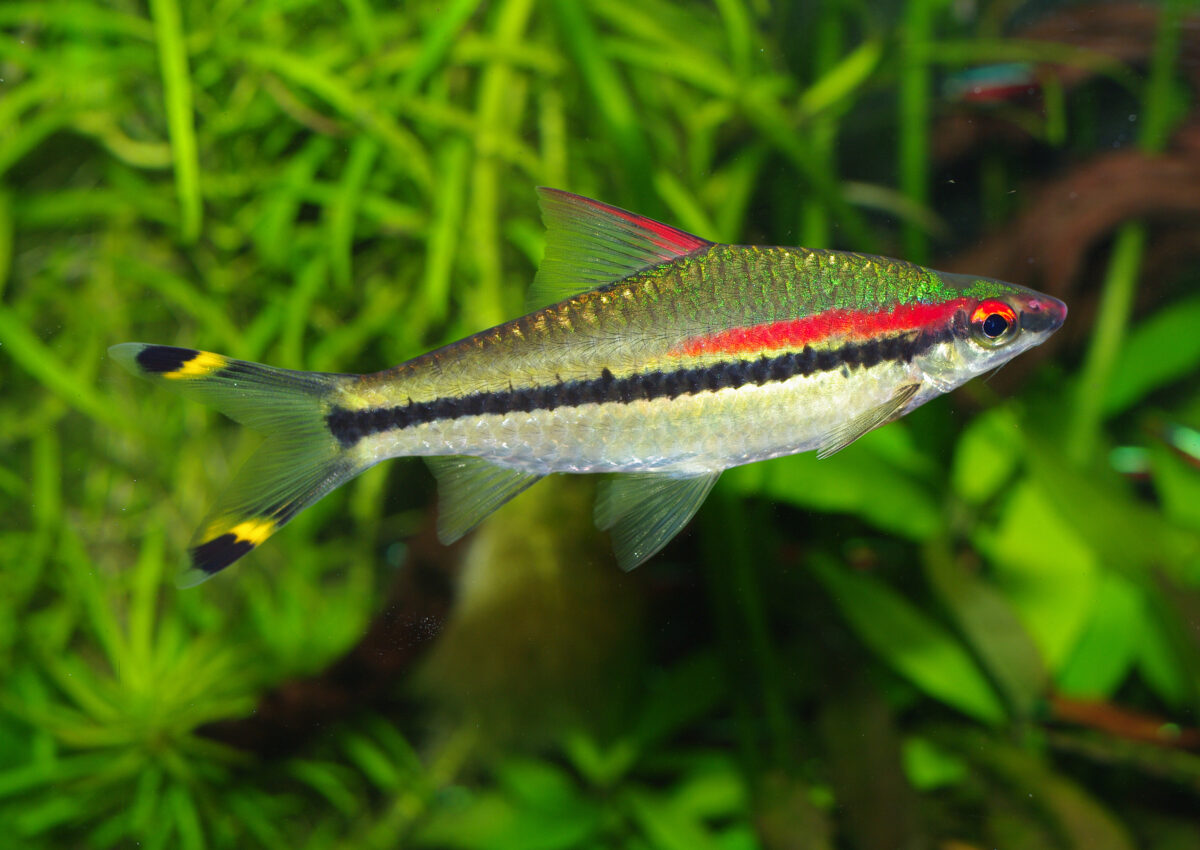Your Roseline shark deserves some friends, but not all are suitable. Let’s take a look at the 15 best Roseline shark tank mates!
The 15 Best Roseline Shark Tank Mates are fish that can handle the same things in terms of space and temperature, but also mesh well with the Roseline Shark in terms of temperament. These should be medium in size so as not to become prey, and peaceful such as Betta fish, Gouramis, and even some species of catfish.
Contents
Roseline Shark Tank Mates – What You Need to Know
Find out everything you need to know about this fish and it’s neighbors!
Temperament
The temperament of a roseline shark is quite peaceful. They are gentle and like to be in a community, being very sociable. That being said, a roseline shark will not do well with fish that are aggressive, or fish that take up too much of their personal space. Plan your tank mates accordingly!
Size
The roseline shark is capable of growing around four to five inches long. This is not especially big, around medium-sized for most aquarium fish. However, this fish will eat fish that are tiny enough, so make sure to pick tank mates that are similar in size!
Competition
Roseline sharks eat an omnivorous diet. They like seaweed and insects in their natural habitat, but will be just as happy with a mixture of flakes, pellets, and frozen foods from you.
Just be sure that any tank mates either have a separate diet or are deferential enough to avoid hogging all of the Roseline Shark’s food at mealtime!
Parameters ; Tank Setup
A roseline shark needs at least 55 gallons in terms of tank size, and more is preferrable, especially when it needs to spend time in close quarters with other fish that are large enough to avoid being eaten. Remember to clean the tank often; Roseline sharks are susceptible to disease from cloudy water.
Aim for a temperature of water between 60 and 77 Fahrenheit for the best results, and get other fish that enjoy the same.
15 Best Roseline Shark Tank Mates
- Cherry Barb
- Betta Fish
- Bristlenose Pleco
- Zebra Danio
- Harlequin Rasbora
- Black Skirt Tetra
- Siamese Algae Eater
- Rainbow Shark
- Emperor Tetra
- Tiger Barb
- Rainbow Krib
- Bolivian Ram
- Rosy Barb
- Congo Tetra
- Apistogramma
Let’s look more closely, without further ado, at our list of the best tank mates for your roseline shark!
Check out these other similar posts:
- Parrot Cichlid Tank Mates
- Kissing Gourami Tank Mates
- Black Skirt Tetra Tank Mates
- Buenos Aires Tetra Tank Mates
1. Cherry Barb
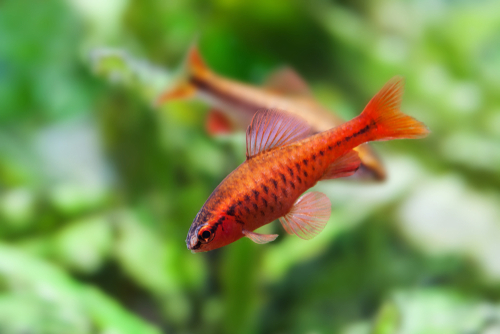
- Scientific Name:Puntius titteya
- Adult Size: 2 inches
- Compatible With: Roseline Sharks
- Care Level: Easy
- Origin: Sri Lanka
With its cherry-life coloration and its light pink under-markings, the cherry barb is a great addition to just about any aquarium. It is adaptable, delightful, and social, enjoying schools of it’s own kind.
The cherry barb may be small but with strength in numbers, it will have no trouble from the larger roseline shark.
Pros of keeping with Roseline Shark:
- No aggression
- No food competition
Cons of keeping with Roseline Shark :
- None!
2. Betta Fish
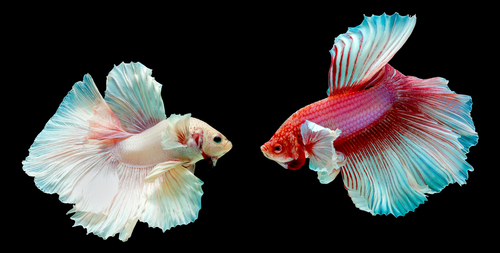
- Scientific Name: Betta splendens
- Adult Size: 3 inches
- Compatible With: Roseline Sharks
- Care Level: Easy
- Origin: Thailand, Cambodia
Everyone who knows anything about fish is likely to have seen or heard of a betta fish! These decadent little swimmers are famous for starting fights to the death with their own kind, just as they are famous for their beautiful petal fins.
These fish fight one another, but they will not fight the roseline shark. These will be great companions!
Pros of keeping with Roseline Shark:
- No food competition
- No aggression with roseline shark
Cons of keeping with Roseline Shark :
- None!
3. Bristlenose Pleco
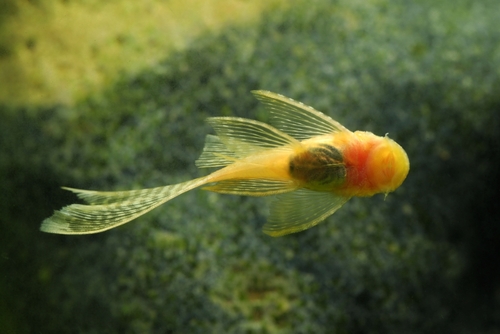
- Scientific Name: Ancistrus cirrhosus
- Adult Size: 5 inches
- Compatible With: Roseline Sharks
- Care Level: Easy
- Origin: Amazon
Plenty of aquariums choose the Bristlenose pleco as an inmate because they are generally able to live at peace with all fish and pull their weight in the tank, too. They tend to eat algae and detritus on the tank floor.
The bristlenose pleco is named for it’s bushy nose, bristling with whiskers. It looks fierce, but it won’t harm any other fish, including the Roseline Shark!
Pros of keeping with Roseline Shark:
- No aggression
- Cleans up the bottom of the tank
Cons of keeping with Roseline Shark :
- None!
4. Zebra Danio
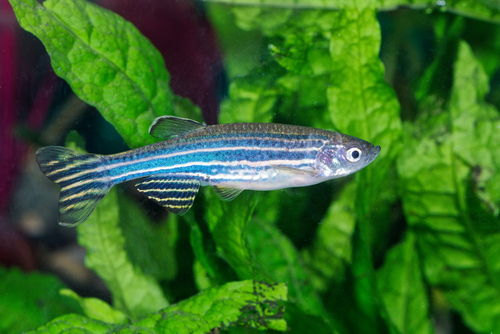
- Scientific Name: Danio rerio
- Adult Size: 2 inches
- Compatible With: Roseline Sharks
- Care Level: Easy
- Origin: Eastern India
The zebra danio is, predictably, named for its stripes over rose-colored scales. It is very small, but much like other fish on this list, not in danger around the roseline shark because it likes to live in a school.
Zebra danios actually bear a little resemblance to the bigger roseline shark in terms of color, and will make a great visual component for any tank.
Pros of keeping with Roseline Shark:
- No aggression
- No food competition
Cons of keeping with Roseline Shark :
- None!
5. Harlequin Rasbora
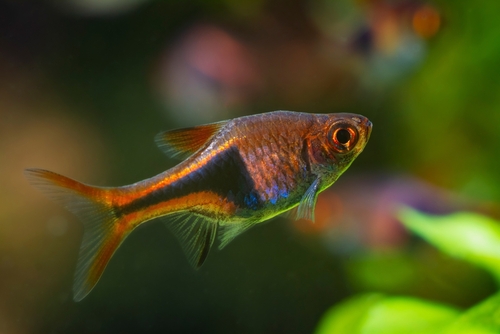
- Scientific Name: Trigonostigma heteromorpha
- Adult Size: 1 inch
- Compatible With: Roseline Sharks
- Care Level: Easy
- Origin: Malaysia, Singapore, Thailand, Southeast Asia, Sumatra
The harlequin rasbora is a shining gold in color with a striking black triangle spotting it’s sides. It is another tiny example of fish that will hold it’s own find with others of it’s own kind.
In addition to being largely peaceful, the harlequin rasbora will pose no threat to your roseline shark’s food sources.
Pros of keeping with Roseline Shark:
- No aggression
- No food competition
Cons of keeping with Roseline Shark :
- None!
6. Black Skirt Tetra
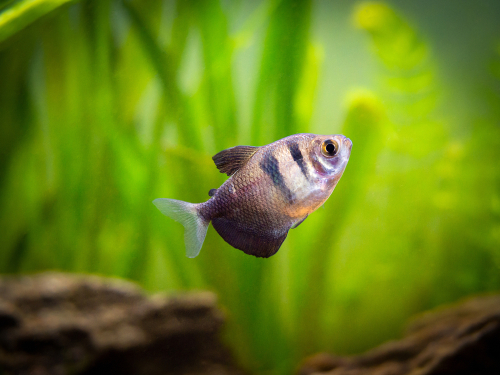
- Scientific Name: Gymncorymbus ternetzi
- Adult Size: 2 inches
- Compatible With: Roseline Sharks
- Care Level: Easy
- Origin: Rio Paraguay, Bolivia, Rio Guapore
The black skirt tetra is named for it’s pretty fringe of darkly-colored belly fins. Otherwise, it is a slate color with some darker indigo to black stripes near the head.
The black skirt tetra is generally peaceful and will cause no trouble for your roseline shark.
Pros of keeping with Roseline Shark:
- No aggression
- No food competition
Cons of keeping with Roseline Shark :
- None!
7. Siamese Algae Eater
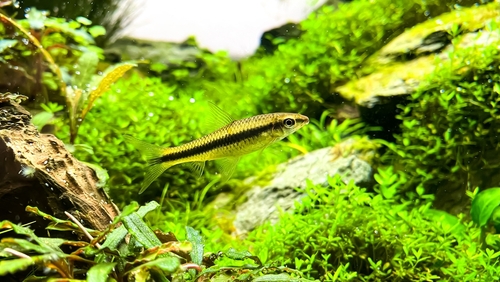
- Scientific Name: Crossocheilus oblongus
- Adult Size: 6 inches
- Compatible With: Roseline Sharks
- Care Level: Easy
- Origin: Southeast Asia, Malaysia, Thailand
This fish may not have a very pleasant name, but it is fun to look at! The siamese algae eater has a sporty silver color with a long black stripe that will match the roseline shark in patterning.
This fish is also peaceful, omnivorous, and close in size to the roseline shark without being as colorful.
Pros of keeping with Roseline Shark:
- No aggression
- No competition
Cons of keeping with Roseline Shark :
- None
8. Rainbow Shark
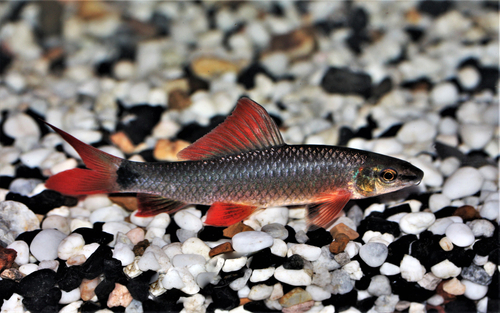
- Scientific Name: Epalzeorhynchos frenatum
- Adult Size: 6 inches
- Compatible With: Roseline Sharks
- Care Level: Easy
- Origin: Thailand, Vietnam, Laos, Myanmar, Cambodia
Another shark on the list, this one is not nearly as colorful as its name would suggest. Actually, the rainbow shark is typically one solid color, either black, gray, or dark blue with more fiery-colored fins.
This fish, unlike others, can be aggressive at times. However, it is so close in size to the roseline shark that it is not likely to bully a fish that can so readily defend itself.
Pros of keeping with Roseline Shark:
- Small chance of aggression
Cons of keeping with Roseline Shark :
- Some food competition
9. Emperor Tetra
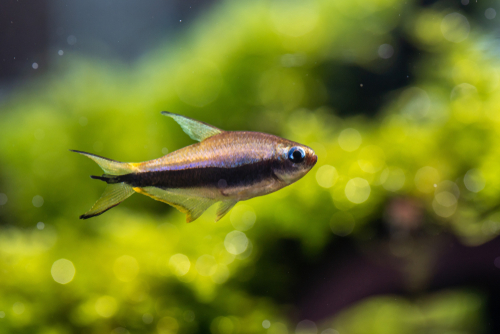
- Scientific Name: Nematobrycon palmeri
- Adult Size: 2 inches
- Compatible With: Roseline Sharks
- Care Level: Easy
- Origin: Colombia
The emperor tetra has a grand, royal name to match it’s iridescent scales, though not its small size. Another schooling fish, this golden-eyed little fellow should have no trouble getting along with a roseline shark!
Pros of keeping with Roseline Shark:
- No aggression
- No food competition
Cons of keeping with Roseline Shark :
- None!
10. Tiger Barb
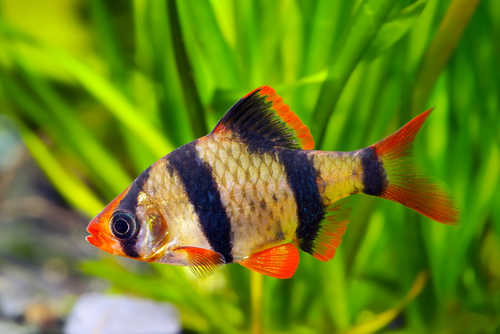
- Scientific Name: Barbus tetrazona
- Adult Size: 3 inches
- Compatible With: Roseline Sharks
- Care Level: Easy
- Origin: Indonesia, Borneo, Sumatra
The tiger barb is a favorite among fish owners. It is shaped pleasingly like a triangle with apricot scales and beautiful black stripes from dorsal to belly. It loves being with it’s own kind, but can be prone to nipping fins if there are not enough of their own kind in the tank.
The tiger barb will, therefore, make a fine addition to a roseline shark’s home.
Pros of keeping with Roseline Shark:
- Not aggressive with enough of it’s own kind
- No food competition
Cons of keeping with Roseline Shark :
- None!
11. Rainbow Krib
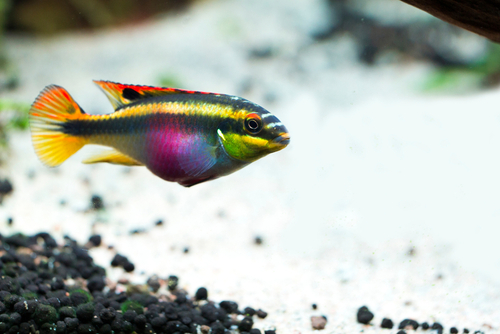
- Scientific Name: Pelvicachromis pulcher
- Adult Size: 4 inches
- Compatible With: Roseline Sharks
- Care Level: Easy
- Origin: Africa
This kribensis fish is actually one of the cichlid family! However, a rainbow krib trades the usual heavy foreheads of this species for a slender body with bright black and rose colors and stylishly upturned fins!
A rainbow kribensis is a very peaceful member of the cichlid group. It lives mainly on the bottom of the tank.
Pros of keeping with Roseline Shark:
- No aggression
- No food competition
Cons of keeping with Roseline Shark :
- None!
12. Bolivian Ram
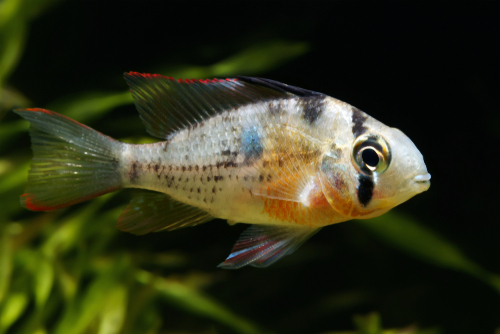
- Scientific Name: Mikrogeophagus altispinosus
- Adult Size: 3 inhes
- Compatible With: Roseline Sharks
- Care Level: Easy
- Origin: Bolivia
At first glance the bolivian ram may have a dirty look to it, as if someone dropped a pretty fish in soil! However, a closer look will reveal an array of speckles over creamy white, orange, and blue markings.
In addition to its beauty, the bolivian ram is peaceful and enjoys spending time with other fish. It is easy to care for, too!
Pros of keeping with Roseline Shark:
- No aggression
- No food competition
Cons of keeping with Roseline Shark :
- None!
13. Rosy Barb
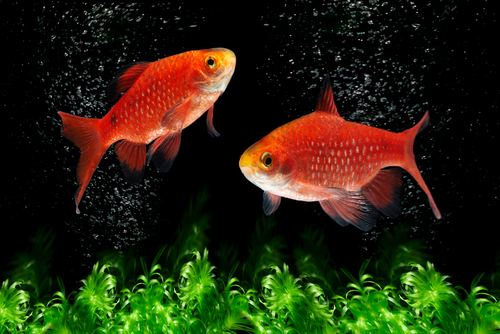
- Scientific Name: Puntius conchonius
- Adult Size: 6 inches
- Compatible With: Roseline Sharks
- Care Level: Easy
- Origin: India
Another beautiful little flake of fire in the barb family, the rosy barb makes a good friend to roseline sharks and matches their rosy stripe perfectly! Rosy barbs are peaceful but love to swim quickly and play with others of their kind.
A rosy barb is named for its shining gold and red scales with ragged-looking fins.
Pros of keeping with Roseline Shark:
- No aggression
- No competition
- Playful
Cons of keeping with Roseline Shark :
- None!
14. Congo Tetra
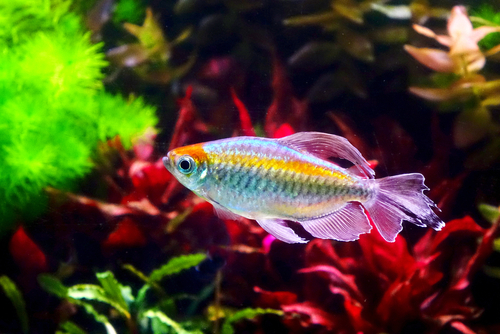
- Scientific Name: phenacogrammus interruptus
- Adult Size: 3 inches
- Compatible With: Roseline Sharks
- Care Level: Easy
- Origin: Congo
Congo tetras are highly peaceful and will get along great as long as others of their own kind contribute to their confidence. They have silver fins, but their bodies rage from reflective blue to orange.
The congo tetra is fun to watch and can bring your tank up to 5 years of enjoyment.
Pros of keeping with Roseline Shark:
- No aggression
- No competition
Cons of keeping with Roseline Shark :
- None!
15. Apistogramma
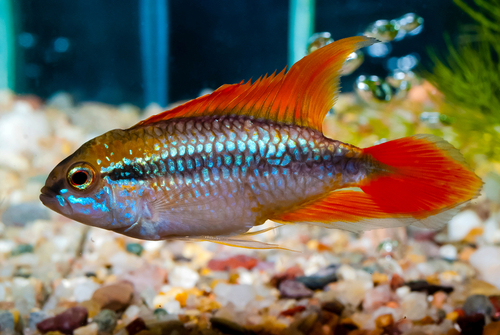
- Scientific Name: Apistogramma agassizii
- Adult Size: 3 inches
- Compatible With: Roseline Sharks
- Care Level: Easy
- Origin: South America
This fish is generally considered one of the more peaceful cichlids in the family, though it still has some aggressive tendencies. Still, since it is smaller than the roseline shark, you shouldn’t have any difficulties.
Apistogrammas are slender with big eyes, glowing electric blue speckles around a navy stripe down an orange body.
Pros of keeping with Roseline Shark:
- No food competition
- No aggressive
Cons of keeping with Roseline Shark :
- None!
In Conclusion
In conclusion, the 15 best Roseline Shark Tank Mates include peaceful fish that are similar in size to the roseline shark at 6 inches. If they are much smaller, like the cherry barb, they should be in groups of their own kind to avoid stress. With these tips, you should have no trouble picking out the best tank mates.

Ian Sterling, founder of Fishlab.com, began his aquarium journey over 30 years ago, driven by a deep fascination for fish and their diverse personalities. His website, Fishlab.com, is dedicated to making fishkeeping accessible and enjoyable, offering beginner-friendly guidance, expert insights, and a community for aquarists to connect and share experiences.


